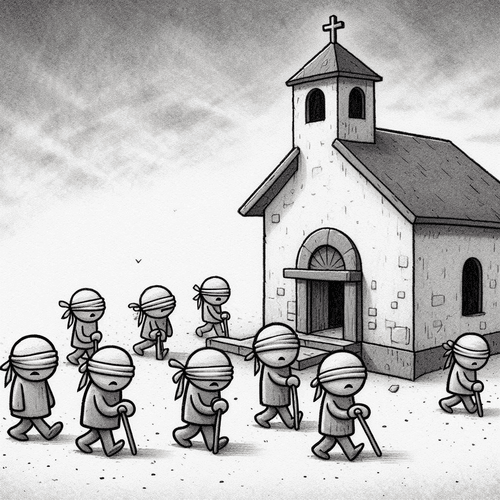Apostasy in the Last Days: What Does the Bible Say?
In His sovereign wisdom, God reveals through Scripture a great falling away will precede Christ’s return. Apostasy—the deliberate abandonment of previously held religious beliefs—isn’t just a possibility but a divinely foretold certainty that confirms God’s Word is true.
For the believer, the increasing spiritual confusion and moral relativism of our day comes as no surprise. Rather, it’s confirmation to us God’s prophetic timeline is unfolding exactly as planned. While the world sees chaos, the elect recognise divine order—sure signs that our redemption is near. Scripture speaks clearly about this end-times apostasy, and through God’s preserving grace, His chosen ones are equipped not merely to endure but to stand firm with confidence in His unfailing promises…
THE GLOBAL DRIFT: SCRIPTURE’S DIRE WARNINGS
The New Testament contains several explicit warnings about widespread apostasy preceding Christ’s return.
The apostle Paul, writing to the Thessalonians, clearly states the Day of the Lord won’t come until the “falling away” first occurs. This departure from faith isn’t a minor drift but a significant, no-holds-barred rebellion against truth.
Paul’s letters to Timothy are particularly revealing: he describes many will abandon sound doctrine in the end times, giving heed to deceiving spirits and teachings of demons. People will maintain an outward appearance of godliness while denying its power—a form of cultural Christianity without genuine faith.
Peter adds his voice to these warnings, cautioning us about false teachers who’d secretly introduce destructive heresies, leading many to follow their sensuality and bringing the way of truth into disrepute.
Jesus Himself warned His disciples many would fall away from faith in the last days, betray one another, and allow their love to grow cold because of increasing lawlessness. This suggests not just individual backsliding but a broader movement away from authentic faith.
APOSTASY IN THE LAST DAYS: WHAT ARE WE TO EXPECT?
Scripture doesn’t just predict apostasy—it describes its nature in detail. Several key characteristics emerge:
- Deception through false teaching: Jesus repeatedly warned about deception, saying many false prophets would arise and mislead many. These aren’t obviously false teachings but subtle distortions of truth that can deceive even the elect if that were possible.
- Moral decline and lawlessness: Paul’s second letter to Timothy describes people in the last days as lovers of self, lovers of money, proud, arrogant, abusive, disobedient, ungrateful, unholy, heartless, and more—while still maintaining a form of godliness. This suggests apostasy isn’t just theological but moral.
- Love of pleasure above love of God: Scripture warns that many will become lovers of pleasure rather than lovers of God. This prioritization of comfort and personal satisfaction above devotion to God manifests in a casual approach to sin and a consumer mindset toward faith.
- Abandonment of sound doctrine: Paul warns that a time will come when people will not endure sound teaching but will gather teachers who satisfy their own desires, turning away from truth to follow myths. This suggests apostasy often involves replacing Biblical authority with teachings that affirm what people already want to believe.
- Spiritual complacency: The church at Laodicea represents this aspect of apostasy—neither hot nor cold, but lukewarm. Their self-satisfaction and spiritual blindness despite material prosperity mirror the condition of many churches today.
HISTORICAL PATTERNS AND MODERN SIGNS
While Christians throughout history have observed signs of apostasy in their times, several contemporary trends align remarkably with biblical warnings:
The erosion of biblical authority is perhaps most concerning. Many churches and denominations that once held Scripture as their final authority now view it as just one voice among many, subject to reinterpretation based on changing cultural norms.
Theological relativism has become commonplace, with core doctrines that Christians have affirmed for centuries—like the exclusivity of Christ for salvation, the reality of judgment, and biblical sexual ethics—now considered negotiable or outdated.
Biblical literacy continues to decline even among regular churchgoers, creating a vacuum where sound doctrine once stood. This knowledge gap makes believers particularly vulnerable to false teaching, as they lack the foundational understanding to discern truth from error.
The rise of prosperity theology and moralistic therapeutic deism reflects the shift toward a self-centred faith. These approaches transform Christianity from a God-centred religion of self-denial into a means of personal fulfillment and material blessing.
Eagerness to yield to the culture around us: Perhaps most subtly, we see a growing willingness to accommodate cultural values at the expense of biblical fidelity. When churches prioritize relevance and acceptance over counter-cultural biblical witness, they begin the slide toward apostasy.
CONCLUSION: A CALL TO VIGILANCE AND HOPE
The widespread apostasy we witness isn’t a cause for alarm but a call to worship—it validates the inerrancy of God’s Word and signals our final rest is at hand. We experience genuine heartache seeing many abandon the faith. But simultaneously, we rejoice in God’s perfect sovereignty. These events unfold not by chance but by divine decree.
For the elect, secured by God’s irresistible grace, apostasy in others serves as a humbling reminder: “there, but for the grace of God, go I.” Our perseverance isn’t of our own strength but entirely the work of the Holy Spirit who preserves His own. The same God who chose us before the foundation of the world will certainly complete the good work He began in us.
As the visible church contracts through this prophesied falling away, the true church—the body of genuine believers—grows not necessarily in number but in sanctification and resolve. God uses these challenging times to purify His bride, separating wheat from chaff, preparing a people wholly devoted to Him.
Until that glorious day, may we remain steadfast in the faith once delivered to the saints, growing in grace and knowledge, confident that He who called us is faithful, and He will surely do it.
APOSTASY IN THE LAST DAYS: RELATED FAQs
How important is sound doctrine in preventing apostasy? Sound doctrine isn’t merely important—it’s essential for the elect’s perseverance in times of widespread deception. God has graciously provided His Word as the standard of truth by which all teaching must be measured, and He uses this truth as the means by which He preserves His chosen ones. When believers anchor themselves in the doctrines of grace, the sovereignty of God, and the sufficiency of Scripture, they receive divine protection against the subtle errors that lead many astray.
- How can believers practice spiritual vigilance in an age of deception? Spiritual vigilance begins with the humble recognition that apart from God’s preserving grace, we too would be carried away by every wind of doctrine. The Lord equips His elect with discernment through regular immersion in Scripture, prayer for wisdom, and the illuminating work of the Holy Spirit who guides us into all truth. Rather than trusting our autonomous reasoning, we submit our thoughts to the authority of God’s Word and the historical confessions of faith that faithfully summarise biblical teaching.
- Why is fellowship with faithful believers essential during times of apostasy? God has ordained His elect will not walk alone but will be preserved within the covenant community of believers where iron sharpens iron. Within the true church, Christ provides elders who shepherd through sound teaching, brothers and sisters who encourage steadfastness, and corporate worship that strengthens faith when apostasy threatens. These means of grace are not optional supplements but divinely appointed channels through which God preserves His own unto the end.
What does biblical endurance look like for the Reformed believer? Biblical endurance for the Reformed believer isn’t an anxious striving to maintain salvation but a confident perseverance empowered by God’s unfailing promise to complete His work. The doctrine of the perseverance of the saints reminds us that those truly regenerated by the Spirit will certainly endure to the end—not by their own strength but through God’s preserving grace. This assurance doesn’t produce complacency but grateful obedience as we work out our salvation with fear and trembling, knowing it is God who works in us both to will and to work for His good pleasure.
- How should we understand God’s preservation of a remnant in light of widespread apostasy? God’s preservation of a remnant throughout history demonstrates His covenant faithfulness rather than human faithfulness. Just as in Elijah’s day when God reserved seven thousand who had not bowed to Baal, the Lord always preserves His elect according to His sovereign choice and irresistible grace. This preservation isn’t based on human merit or superior insight but on God’s unconditional election, giving us confidence that even in the darkest times of apostasy, Christ’s church can never ultimately fail.
- How can believers maintain joy while witnessing widespread apostasy? Believers maintain joy amidst apostasy by fixing their eyes not on the disheartening spectacle of many falling away, but on God’s sovereign purposes being fulfilled exactly as Scripture foretold. Our joy is grounded not in visible success but in knowing that these events signal Christ’s imminent return and our approaching final rest. Moreover, we rejoice that our own standing in grace depends not on our feeble grip on God, but on His unbreakable grip on us, guaranteeing that nothing—including widespread apostasy—can separate us from His love.
What role does prayer play in remaining faithful during times of apostasy? Prayer is a sovereign means by which God conforms His elect to Christ’s image and preserves them from falling away. Through prayer, believers acknowledge their complete dependence on God’s sustaining grace rather than their own strength or wisdom. The Holy Spirit intercedes for us according to God’s will, ensuring that our prayers align with God’s purposes of preserving us to the end and purifying His church through trials. Regular communion with God through prayer keeps our hearts anchored in eternal realities when temporal circumstances might otherwise lead us to despair.
APOSTASY IN THE LAST DAYS: OUR RELATED POSTS
- Signs of Christ’s Return: Are We in the Last Days?
- Judgement Day is Almost Here: Are We Ready?
- The Second Coming of Jesus: Why Hasn’t He Returned Yet?
Editor's Pick

Will We Remember This Life in Heaven? What Isaiah 65:17 Means
"Will I remember my spouse in heaven? My children? Will the joy we shared on earth matter in eternity?" These [...]

From Empty to Overflow: The Abundant Life Jesus Promised
(AND WHY YOU SHOULDN’T SETTLE FOR LESS) We're surviving, but are we thriving? If we're honest, there's a gap between [...]

What Does Jesus Save Us From?
THREE BIBLE TRUTHS ABOUT SALVATION "Jesus saves." We’ve seen it on bumper stickers, heard it shouted at sporting events, maybe [...]

If God Wants Everyone Saved, Why Aren’t They?
THE REFORMED VIEW ON GOD’S DESIRE VS HIS DECREE The question haunts every believer who has lost an unbelieving loved [...]

The One Man Mystery in Acts 17:26: Is It Adam Or Noah?
When the Apostle Paul stood before the philosophers at Mars Hill, he delivered an insightful statement about human unity: “And [...]

Megiddo Or Jerusalem: Where Did King Josiah Die?
Recent archaeological discoveries at Tel Megiddo continue to reveal evidence of Egyptian military presence during the late 7th century BC, [...]

Losing Your Life Vs Wasting It: How Are the Two Different?
AND WHY DID JESUS PRAISE THE FORMER? Jesus spoke one of the most perplexing statements in Scripture: “For whoever wants [...]

Can Christians Be Demon Possessed? What the Bible Teaches
Perhaps you’ve witnessed disturbing behavior in a professing Christian, or you’ve struggled with persistent sin and wondered if something darker [...]

Sacred Fury: What Christ’s Temple Cleansing Truly Means
Mark 11 records the crack of a handmade whip that echoed through the temple corridors. Tables crashed to the ground, [...]

Did Jesus Cleanse the Temple Twice?
OR DID JOHN DISAGREE WITH THE SYNOPTICS ON TIMING? One of sceptics’ favourite "gotcha" questions targets what they see as [...]
SUPPORT US:
Feel the Holy Spirit's gentle nudge to partner with us?
Donate Online:
Account Name: TRUTHS TO DIE FOR FOUNDATION
Account Number: 10243565459
Bank IFSC: IDFB0043391
Bank Name: IDFC FIRST BANK






